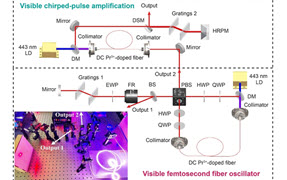Shining Light Around the Globe
As a professor and a clinician in a hospital, I have the privilege of interacting every day with physicians and researchers who are at the beginning of their careers. Teaching, mentoring, and even learning from these intelligent and compassionate scientists as they apply their training to meet our patients' health issues is one of the great joys of my career. I am continually inspired by their creativity, commitment, and idealism.
My involvement in the leadership of SPIE, including serving on committees, the Board of Directors, and this year as president, has introduced me to many more optics and photonics practitioners around the world. In my travels on behalf of SPIE, to Brussels, Lima, Beijing, Paris, Singapore, Riga, San Francisco, Trieste and elsewhere, I continually meet students and researchers who are just as motivated as those I know at home in Sweden.
They are mostly using the unique properties of light; some to diagnose and treat disease, like my students, and some to work towards a deeper understanding of biological processes. Others are working in the many areas of science and life where photons are key. They look across the cosmos for life or at single molecules, detecting muons in ice or looking for gravitational waves, studying our planet and trying to resolve our energy issues.
I am inspired by the bright young (and not so young minds) across the world putting our cumulative knowledge of optics and photonics to good purpose.
While the dedication and creativity are shared throughout the world, I have also seen that opportunities are not the same everywhere. Laboratories with the latest equipment and opportunities for education and research are not readily available in every country.
In addition, in some regions it is extremely difficult to develop the infrastructure from scratch. We quickly forget the importance of "connecting minds," the local and international network that is so vital to advancing research and so important to furthering the work of individual scientists and engineers.
I am grateful to have the role of helping SPIE deliver such opportunities to researchers and students in regions where the need is great. Guided by the vision and desires of its members you the Society annually funds scholarships, grants, and other educational outreach programs around the world.
Last year, SPIE contributed more than $2.3 million in support to such activities. The hard-working Scholarship Committee selects scholarship winners. We also support developing regions though the International Centre for Theoretical Physics (ICTP) in Trieste, the UNESCO Active Learning in Optics and Photonics (ALOP) program, and through the International Network for the Availability of Scientific Publications (INASP) to provide our publications at no charge.
The importance of connections and networking cannot be overstated. From earliest times, the advance of science has been aided by collaboration. The contribution of any individual is amplified and often sparked through the input from colleagues, and by application of existing knowledge.
The face-to-face access to others working in one's field is priceless in establishing strong and useful networks. Many of the programs SPIE and its members support create those opportunities through travel grants and regional programs.
Working together, as a Society, we can do a great deal to increase opportunities in regions where relatively few exist. I encourage you to look at the list of projects and programs supported by SPIE, and see where you may help make a difference through these activities that touch so many lives.
Each of us can help as an individual. We strongly encourage you to mentor a young scientist or engineer anywhere. We can help connect you to those in challenged regions of the world. There is likely also much young talent in your own neighborhood that can be inspired and encouraged.
I urge you to get involved, however you can, in supporting researchers who need resources or networks, and in communicating about how photonics can change lives.
I assure you that you will be inspired as a result.
At a meeting of the SPIE Engineering, Science, and Technology Policy Committee during Photonics West in San Francisco in January, 20 people were asked to share what they have done in the past year to advance the understanding of science in their communities.
Those 20 people reported around 60 different activities, many of them not associated with formal programs.
They provided opportunities for students to visit their labs, gave optics demonstrations for their children's classrooms, judged community science fairs, provided testimony to policy makers on the importance of funding for scientific research and education, and much more.
Have you done something similar?
Let us know. Write to governance@spie.org.
Have a question or comment about this article? Write to us at spieprofessional@spie.org.



